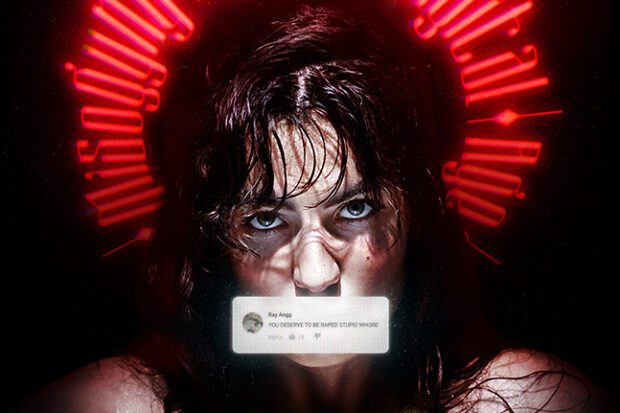
On April 11, CineCulture will present the Canadian documentary film Backlash: Misogyny in the Digital Age by co-directors Guylaine Maroist and Léa Clermont-Dion. Backlash follows four women who have been victims of cyber-violence and digital misogyny. It also shows the father of a girl who committed suicide due to unrelenting cyber-bullying. The film shows the impact the cyber-violence has on their personal and public lives and how each one of them battles against these attacks to silence their voices.
Co-director Guylaine Maroist, who will be available to discuss the film following the screening, says that the term cyberbullying first appeared in English in 1998. It was used to describe activities by men on the Internet targeting women who were speaking out on the issues of the day.
She said that these “Internet guys” felt free to target the few women on the Internet. The men viewed the women as interlopers and outsiders who were invading their “safe place.” Due to systemic misogyny, not only were there few women using the Internet but there was also little legal protection when they were attacked and threatened in attempts to silence their voices.
Maroist began research on the movie in 2015. She said that it is not uncommon for her to spend 10 years researching background on her movies. She interviewed 30 victims of cyberbullying, choosing four stories for the movie. She also spoke to hundreds of women experts on systemic misogyny, such as lawyers and scholars.
She was surprised by the vehement backlash she received after the release of the movie. With the release of the movie in 2023, she had hoped things would get better for women. The election of Trump changed that.
Like many Canadians and Europeans, she is disturbed and frightened by his election, which has resulted in more misogyny and cyberbullying of women. She feels women will now have to fight for their right to speak out in public spaces because they cannot expect much help from the government.
Maroist made the movie to raise awareness of cyberbullying as a threat to women’s voices in public places, realize the need for education of young people about cyberbullying in the digital age, gain support for women to oppose systemic misogyny, have police change their response to cyberbullying threats and encourage new laws regarding cyber-violence. She says that cyber-violence is violence and should be addressed with new laws, as has happened in Canada and Europe.
One of the four female subjects of the film, Laura Boldrini, president of Italy’s Chamber of Deputies from 2013 to 2018, did get new laws passed. She received thousands of digital threats and attacks for her pro-feminist, pro-immigrant politics, including one from the mayor of Pontinvrea, Matteo Camiciottoli, who said men should rape Boldrini “to put a smile back on her face.” She won her lawsuit against him for defamation and got an anti-cyberbullying law passed in Italy in 2017.
The opposite seems to be happening in our country. In an attempt to cozy up to Trump, Mark Zuckerberg’s Meta (owner of Facebook and Instagram) has made the Internet less safe by reducing content moderation, prioritizing free expression in the guise of hate speech and reducing what he perceives as overzealous censorship.
He eliminated an independent fact-checking system in favor of a “user-based system.” He is allowing more harmful content by removing hate restrictions on topics such as immigration and gender. The automated filters now allow calls for exclusion and “insulting language” toward marginalized groups. The filters only remove illegal and high-severity violations.
On Jan 7, citing concerns about biased employees and the need to prioritize free speech, Zuckerberg relocated Meta’s (Facebook, Instagram) trust, safety and content moderation teams from California to Texas.
Maroist’s movie has been shown in 51 countries. She would like the young, the old and especially men to see the movie. In contrast to Zuckerberg and other social media platforms, she said the movie is a call to make the Internet a safer place, support women’s voices and oppose misogyny.
CineCulture is a film series at Fresno State that provides students, faculty, staff and the general public an opportunity to see indie films and foreign films, at no charge. There is no other local venue where one can see such a diverse range of films.
CineCulture is led by Dr. Mary Husain, a lecturer at Fresno State in the College of Arts and Humanities Department. She serves as director/advisor of CineCulture, an academic course at Fresno State. The films are shown during the school year on Fridays at 5:15 p.m. at the Peters Education Center Auditorium on campus.
In these times of the U.S. government’s oppression of opposing viewpoints and suppression of different ideas, CineCulture bravely continues to show films that promote awareness of humanity’s cultural diversity. The films often address oppression based on race, gender and poverty.
After each screening, there is a discussion with professors or the directors or actors from the films regarding the social and political significance of the movies. The director is staying in Canada but she will be available via Zoom. Kiah Morris will be available in person to discuss the movie and cyberbullying. Morris was one of the women profiled in the movie Backlash: Misogyny in the Digital Age.
Morris is a Democrat who served as a member of the Vermont House of Representatives from 2014 to 2018. She did not seek reelection to a third term following a campaign of racist cyber threats against her and her family. Due to the ongoing serious threats, and the lack of response from law enforcement, she had to leave the town she and her husband were living in.
